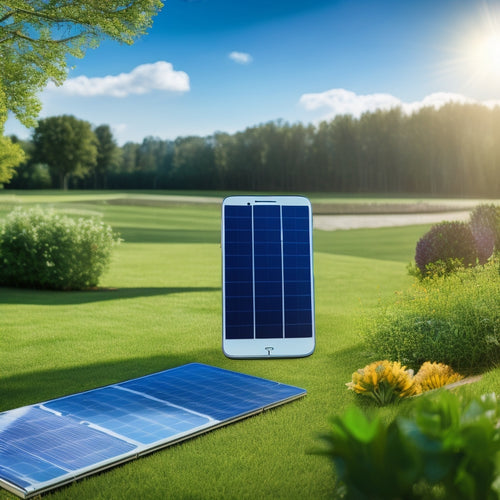
What Inverters Are Best for Camping Van Adventures?
Share
When choosing an inverter for your camping van adventures, prioritize safety and reliability by opting for reputable brands like Renogy, Victron Energy, Magnum Energy, and Xantrex, which offer certified products from organizations like UL or ETL. Consider your power output needs, ensuring compatibility with your solar panels and appliances, and don't forget to factor in size and weight constraints. You'll want to calculate your peak power demands, prioritize energy allocation, and choose an inverter that meets your continuous power needs. As you prepare for your next adventure, explore the nuances of inverters, converters, and charge controllers to optimize your off-grid system.
Key Takeaways
• Prioritize safety and reliability by choosing inverters from reputable brands like Renogy, Victron Energy, Magnum Energy, and Xantrex.
• Consider inverter power output, compatibility with solar panels, and size and weight for optimal usage in camping vans.
• Calculate peak power demands and prioritize energy allocation for essential appliances, ensuring compatibility with solar panels.
• Select high-efficiency converters with voltage regulation and monitoring capabilities for efficient energy management.
• Opt for budget-friendly inverter options with built-in fuses or circuit breakers, and utilize online shopping tips to save money.
Cheap Solar Inverters Online Options
When scouring the web for affordable inverter solutions, you'll find a plethora of online retailers offering cheap solar inverters that can meet your camping van's energy needs.
Be cautious, though - not all online deals are created equal. It's important to prioritize safety and reliability when selecting a solar inverter for your camping van. Discount websites can be tempting, but it's vital to research the seller's reputation and the product's certification.
Look for inverters with certifications from reputable organizations like UL (Underwriters Laboratories) or ETL (Intertek). Be wary of extremely low prices, as they might indicate a low-quality or counterfeit product.
Instead, focus on finding reputable online retailers that offer competitive pricing without compromising on safety and performance. Some online marketplaces, like Amazon or eBay, can be a good starting point, but make sure to read reviews and check the seller's ratings before making a purchase.
Top Brands for Camping Vans
You can rely on established brands that specialize in solar inverters for camping vans, as they offer a range of products that cater to different energy needs and budgets. When it comes to Van Life, brand loyalty is essential for a safe and enjoyable adventure.
Here are some top brands you can trust for your camping van's power needs:
-
Renogy: Known for their high-quality solar panels and inverters, Renogy offers a wide range of products suitable for camping vans.
-
Victron Energy: With over 45 years of experience, Victron Energy is a leading brand in the solar inverter industry, offering reliable and efficient products.
-
Magnum Energy: Magnum Energy is a popular choice among campervan owners, offering a variety of inverters and charging systems designed for off-grid adventures.
- Xantrex: With a focus on innovation and quality, Xantrex provides a range of solar inverters and charging systems perfect for camping vans.
These brands have built a reputation for delivering reliable and efficient products, ensuring your camping van's energy needs are met while maintaining safety and performance. By choosing a reputable brand, you can enjoy a worry-free Van Life experience.
Inverter Power Output Considerations
When selecting an inverter for your camping van, you'll need to take into account the power output requirements to make sure you can run your appliances smoothly.
You'll want to calculate both your peak power demands, such as when you're starting a fridge or pump, and your continuous power needs, like running lights and laptops.
Peak Power Demands
Peak power demands, which occur when multiple appliances are used simultaneously, necessitate careful contemplation of an inverter's power output to make sure it can handle the surge in energy requirements. As you plan your camping van adventure, you'll need to guarantee your inverter can handle the peak power demands of your appliances.
To determine your peak power demands, you'll need to perform load calculations. This involves calculating the total power requirements of all your appliances when they're used simultaneously. You'll need to contemplate the power spikes that occur when appliances like refrigerators and air conditioners start up.
Here are some key considerations for peak power demands:
-
Appliance startup power: Some appliances, like refrigerators, require a higher power output when they start up.
-
Simultaneous usage: Calculate the total power requirements when multiple appliances are used at the same time.
-
Power factor correction: Ensure your inverter can handle the power factor correction requirements of your appliances.
- Safety margin: Build in a safety margin to account for unexpected power spikes or appliance failures.
Continuous Power Needs
Your camping van's continuous power needs dictate the inverter's power output, requiring careful consideration of the total power requirements of all appliances running simultaneously over an extended period. To determine the necessary inverter power output, you'll need to calculate the total continuous power draw of your appliances. This includes items like lights, laptops, and refrigerators.
| Appliance | Power Draw (W) | Energy Priority |
|---|---|---|
| Laptop | 65 | High |
| Refrigerator | 120 | High |
| Lighting | 20 | Medium |
| Water Pump | 40 | Medium |
| Vent Fan | 10 | Low |
Create a power hierarchy to identify essential appliances and prioritize energy allocation. This guarantees that critical systems, like refrigeration and lighting, receive adequate power. Consider the total power draw and adjust your energy usage accordingly. A suitable inverter should be able to handle the continuous power needs of your camping van, ensuring a safe and reliable energy supply.
Compatibility With Solar Panels
When choosing an inverter for your camping van, you'll want to make sure it's compatible with your solar panel setup. This involves considering the inverter's maximum power point tracking (MPPT) capacity and confirming it aligns with your solar panel's output voltage and current ratings.
Solar Panel Integration
You'll need to verify that your inverter is compatible with your solar panel system to efficiently harvest and convert sunlight into electrical energy. This is important for maximizing energy harvesting and panel efficiency. When selecting an inverter, make sure it's designed to work seamlessly with your solar panel setup.
Here are some key considerations:
-
Maximum Power Point Tracking (MPPT): Look for an inverter with built-in MPPT to optimize energy harvesting from your solar panels.
-
Voltage and Current Ratings: Confirm the inverter's voltage and current ratings match your solar panel system's output to prevent damage or inefficient energy conversion.
-
Communication Protocols: Check that the inverter is compatible with your solar panel system's communication protocols, such as Modbus or CANbus.
- Monitoring and Control: Choose an inverter with built-in monitoring and control capabilities to track your energy production and system performance.
Power Output Matching
To guarantee a seamless integration, the inverter's power output must be carefully matched with the solar panel array's electrical characteristics to prevent energy losses and optimize system performance. As you design your camping van's electrical system, it's essential to ensure the inverter's output aligns with the solar panel's voltage and current ratings. This matching process is crucial for efficient energy harvesting and to prevent damage to your equipment.
| Inverter Output | Solar Panel Characteristics |
|---|---|
| Voltage (V) | 12V, 24V, 48V |
| Current (A) | 10A, 20A, 30A |
| Power (W) | 200W, 400W, 600W |
| Frequency (Hz) | 50Hz, 60Hz |
Converters for Off-Grid Systems
As you design your off-grid system, selecting the right converter becomes essential to guarantee smooth power conversion and efficient energy management. A converter's primary function is to convert DC power from your solar panels or battery bank to AC power for your appliances.
For an off-grid lifestyle, you need a converter that can effectively manage your energy resources.
When choosing a converter, consider the following key factors:
-
Efficiency: Look for converters with high efficiency ratings (above 90%) to minimize energy losses.
-
Power rating: Make sure the converter can handle your system's maximum power output.
-
Voltage regulation: Choose a converter that can control voltage fluctuations to protect your appliances.
- Monitoring capabilities: Opt for a converter with built-in monitoring features to track your energy usage and system performance.
Charge Controllers for Safety
When designing an off-grid power system, incorporating a reliable charge controller is essential to prevent battery overcharging, overheating, and even fires. You'll want a charge controller that can detect faults and prevent overheating, ensuring your safety on the road.
A high-quality charge controller will continuously monitor your system's voltage, current, and temperature, detecting any anomalies that could lead to a catastrophic failure.
Look for a charge controller with built-in fault detection capabilities, which can identify issues such as short circuits, overvoltage, and overheating. This feature will automatically disconnect the system in case of a fault, protecting your batteries and other components from damage.
Overheating prevention is also vital, as excessive heat can reduce the lifespan of your batteries and increase the risk of a fire. A good charge controller will have built-in overheating prevention mechanisms, such as automatic shutdown or reduced charging rates, to prevent thermal runaway.
Inverter Size and Weight Matters
You'll need to carefully consider the inverter's physical dimensions and weight, as a bulky or heavy unit can greatly impact the overall layout and maneuverability of your camping van.
When choosing an inverter, consider the following key factors:
-
Portability concerns: A heavier inverter can make it difficult to transport and store, so look for lightweight options that still provide reliable performance.
-
Space constraints: Measure your van's storage space and make sure the inverter fits comfortably without obstructing walkways or essential components.
-
Installation flexibility: Opt for an inverter with a compact design that allows for versatile installation options, such as wall-mounting or floor-standing.
- Efficient cable management: Consider an inverter with built-in cable management features to keep your van's interior organized and clutter-free.
Budget-Friendly Inverter Options
Camping van enthusiasts on a budget can find reliable inverter solutions that balance performance with affordability, offering a range of options that won't break the bank.
You can opt for modified sine wave inverters, which are a cost-effective alternative to pure sine wave inverters. Although they may not be suitable for sensitive electronics, they're perfect for powering lights, laptops, and other basic appliances.
Look for inverters with high energy efficiency, as they'll help reduce energy losses and minimize your carbon footprint. When choosing a budget-friendly inverter, consider the cost benefits of a model that's compact, lightweight, and easy to install. A compact inverter will also save you valuable space in your camping van.
Additionally, consider an inverter with a built-in fuse or circuit breaker to guarantee your safety while using electrical appliances.
Online Shopping Tips and Tricks
Shopping online for an inverter can be an intimidating task, particularly with the numerous options available, so it's important to develop a strategy to navigate through the virtual aisles efficiently. You'll want to make sure you're getting the best deal for your camping van adventure.
Here are some online shopping tips and tricks to keep in mind:
-
Read reviews and product descriptions carefully to understand the inverter's specifications, features, and warranty.
-
Compare prices across multiple websites to find the best deal, and don't forget to factor in shipping costs.
-
Take advantage of coupon codes and discounts to save even more. Sign up for newsletters and follow your favorite retailers on social media to stay informed about promotions.
- Master shipping hacks, such as free shipping thresholds or bundle deals, to reduce your overall cost.
Frequently Asked Questions
Can I Use a Power Inverter for Both AC and DC Appliances?
You'll need an inverter with dual voltage capability to power both AC and DC appliances, ensuring inverter compatibility; look for a model that supports both voltage types to safely operate your devices.
How Do I Ground My Inverter for Safe Operation?
When grounding your inverter, you'll need to follow proper Grounding Methods, taking essential Safety Precautions to prevent electrical shocks and fires; establish a secure connection to your van's chassis or a grounding rod, and always refer to your inverter's manual for specific guidance.
Are Pure Sine Wave Inverters Really Worth the Extra Cost?
"Are you willing to risk appliance damage and safety hazards for a cheaper option? Pure sine wave inverters provide Sine Wave Benefits like reduced electromagnetic interference and increased compatibility, justifying the extra cost in the long run."
Can I Connect Multiple Inverters for Higher Power Output?
You can connect multiple inverters for higher power output through inverter syncing or power stacking, but make sure compatible models, proper wiring, and safety precautions to avoid electrical shock or system damage.
Do I Need a Separate Battery Monitor for My Inverter System?
You'll want to guarantee reliable Battery Management, so yes, you'll need a separate battery monitor for your inverter system, as it's crucial for Monitoring Essentials like tracking state-of-charge, voltage, and temperature to prevent over-discharge and ensure safe operation.
Related Posts
-

What Do Power Strips Do for Standby Energy?
You're likely aware that your devices, such as TVs and computers, continue to draw power even when turned off, a phen...
-

7 Best Solar Panel Upkeep Apps for Homeowners
You can optimize your solar panel's energy output and efficiency by up to 20% with regular maintenance, which is wher...
-

10 Eco-Friendly Air Management Tools for Clean Home Living
You're taking an essential step towards creating a healthier living space by seeking eco-friendly air management tool...


